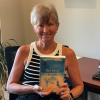Yes! You Can Write Your First Novel

Three years ago, on a bright Minnesota morning, I sat close to my computer waiting patiently for my iWatch to alert me that it was time to register for The Loft Literary Center’s Year-Long Novel Writing course. I approached the moment with the naïve enthusiasm of someone on a first date: excited but nervous about whether or not this was going to be a good match for me. When my alarm buzzed, I registered. I was committed.
It wasn’t until days later that reality set in. Could I write a novel? I had done a lot of writing in my life, but most of it was professional and nonfiction. Was I delusional? Perhaps. But I also knew that I didn’t give up easily once I started something.
After three years of writing and editing, I finished The Blue Trunk. It’s a story of two women: a contemporary woman, Rachel, and her ancestor, Marit. Readers travel between two time periods and become a part of Rachel’s story as she manages a potentially life-altering discovery about her husband. Marit faces unrelenting trials that leave readers questioning how she survived. Ultimately, both stories resolve, revealing that these two women, separated by a century, yet connected by blood, share a strength and resilience that we couldn’t have imagined.
A variety of challenges existed for me as I began this journey. Upon reflection, a few key factors were helpful in making this novel a reality.
First, I was inspired. My novel tells the imaginary story of my real great-great aunt who immigrated from Norway and disappeared shortly after she arrived in Wisconsin. I was told that she was “insane.” I could have left well enough alone, as my mother advised, but I wanted to discover more about this mysterious woman. My research brought me to the sad conclusion that she likely spent her entire life in an institution and is buried in an “unknown” grave in a cemetery in my hometown. In the early-1900’s, institutionalized individuals often became wards of the state and had few rights and little identity. The Blue Trunk was my way of reclaiming her life.
Second, I was open to learning. I had to be. My day job as a college professor and consultant taught me the value of feedback. I learned early on in my career that criticism would be bountiful and it was best to listen, use what I could, and toss what didn’t work for me and my writing. This experience proved to be helpful as I opened myself to feedback from my cohort peers and instructor. I had an excellent teacher and a talented and wonderfully committed cohort. I read their work, took in their feedback, and continued to be blown away by their talent. In some cases, I modeled them. In the end, my creative writing skills improved and I am proud of the writing in The Blue Trunk.
Third, I had good editors. It is critical to know your blind spots. I am not a visual person and I can miss some obvious errors. “The the” at the end of a line? I’ll miss it every time! When I read, I hear words rather than see them. I hired an editor before I even tried to get an agent or publisher. I’m not ashamed to admit that. Editors can catch big and small errors in timelines and details and are knowledgeable about contemporary rules of grammar. And I discovered which of my friends are visual readers and called on them to help.
Fourth, I learned about voice and point of view. My novel travels between two time periods and two main characters. I had to be able to differentiate the voices of each story. I did this by spending hours being in character. I would take walks and become Marit. Or I would spend time with my dog and be Rachel. I would consider the thoughts I imagined them having and behave in ways I expected them to behave. My family tolerated me being in the “Marit-zone” or “Rachel-zone” and I am grateful for that. Careful consideration of voice and point of view is important to creating a readable and enjoyable novel.
Finally, I am stubborn and persistent. Routine works. Write every single day, even if it is only for a few minutes. And accept that there will be good days—the ones when your mind wanders off to who will play your main character in the Netflix series—and bad days—when you question your talent and skill and wonder why you ever thought you could be a writer.
Writing a novel isn’t easy, but it’s not rocket science. It’s a mix of inspiration, support from good people, a lot of hard work, and a large dose of stubborn persistence.
Yes, you too, can write a novel.
